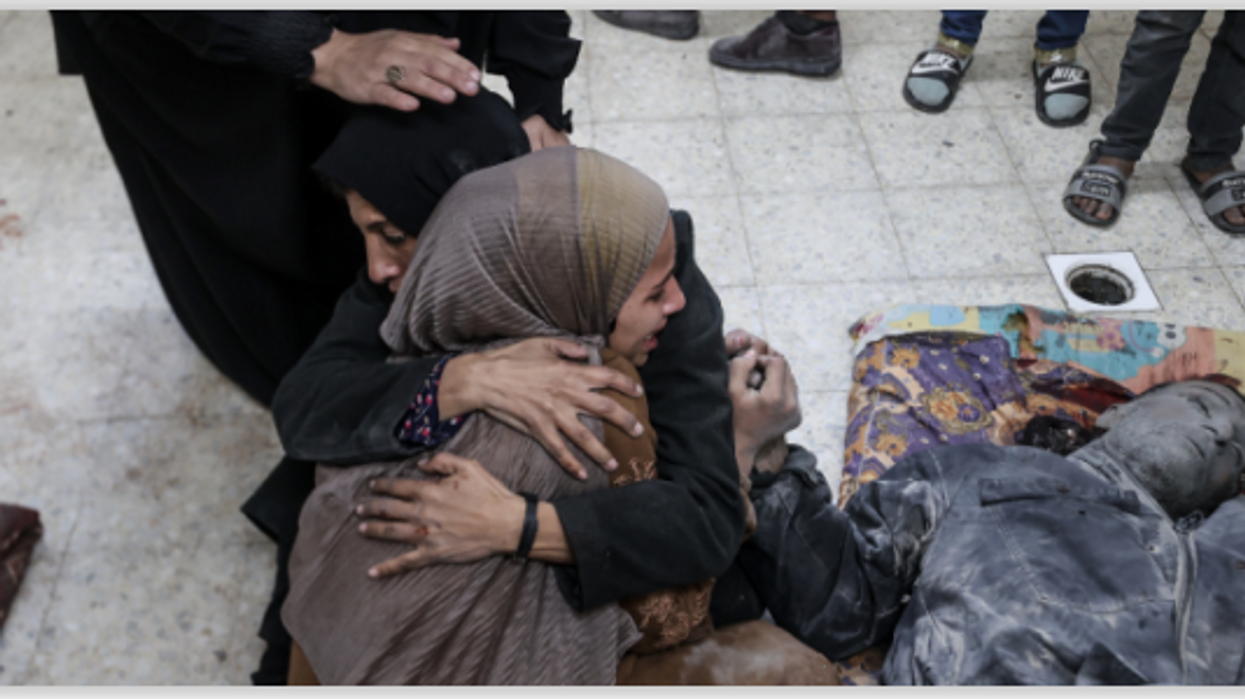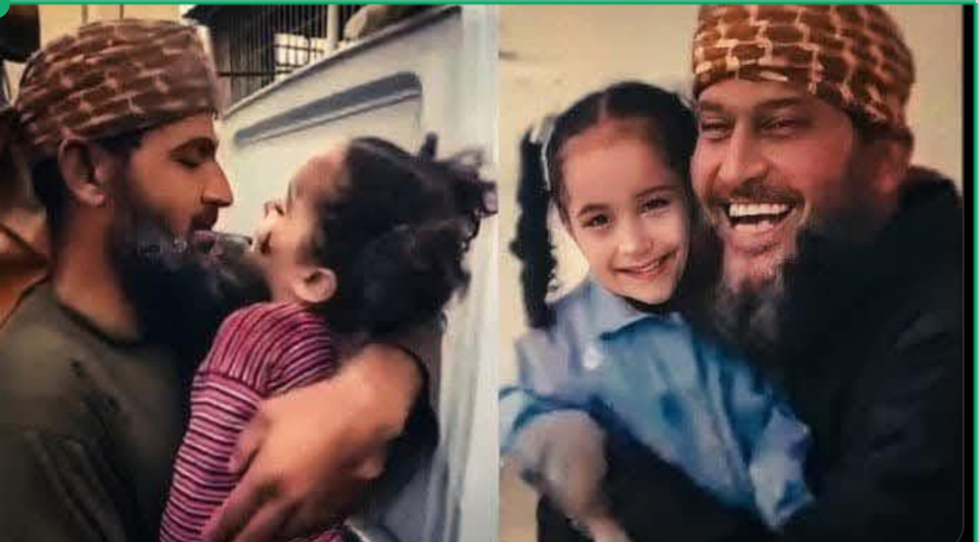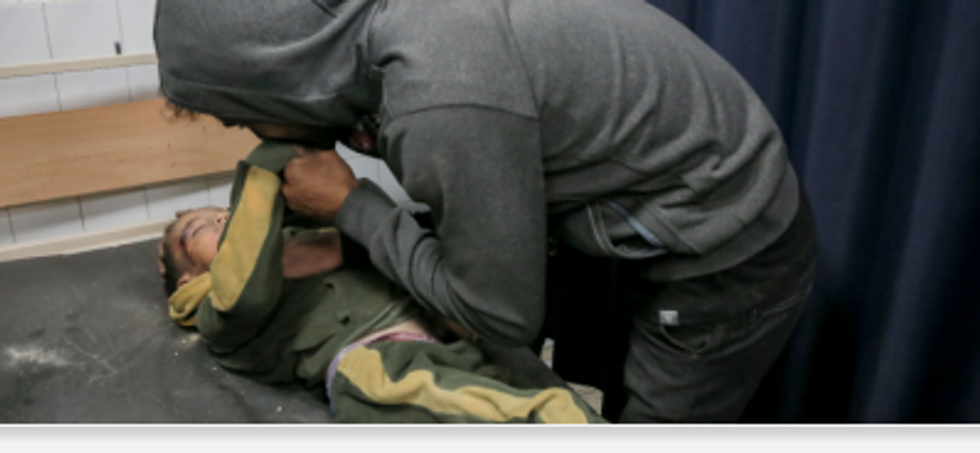
Harrowing headlines still spew from Gaza: They have run out of body bags, 96% of children feel their death is imminent, it is the worst slaughter of civilians in history, everyone is starving. Last week, an "icon of Gazan suffering" was killed, like his toddler grandchildren before him, by "the most evil army on earth.” And a year after the murder of poet and teacher Refaat Alareer, his posthumous writings were released. Its searing, plaintive thesis: "If I must die/Let it bring hope."
Still, hope is scant. The death toll has passed 45,000, two thirds of whom are women and children, many (unfathomably, still) shot in the head and chest by Israeli snipers. Also killed are at least 1,000 health workers, 200 journalists, many hundreds of teachers and writers, a people's torchbearers. Health care and homes are decimated, Israel's brutal blockade has left most Gazans without power or water and starving or at least hungry, nearly 107,000 have been wounded or maimed, untold thousands of dead remain rotting under rubble. Almost a year after international jurists declared Israel is committing genocide - ungodly news an indifferent world met with thunderous silence - Amnesty International has just released a meticulously detailed, 300-page report confirming that yes, it is. They added, "Month after month, Israel has treated Palestinians in Gaza as a subhuman group unworthy of human rights and dignity."
Despite their ongoing, perversely preposterous claims of trying really hard not to kill civilians, from Oct. 8, 2023 onward Israel's war against a trapped, traumatized population has been "by all measures and standards a 'war' against civilians, a war of depopulation, with no precedents in this century," according to U.K-based watchdog Airwars, which tracks civilian harm from aerial bombardment. During its first month, an Airwars report found harm to civilians "incomparable with any 21st century air campaign," with the rate of killings of thousands of civilians, children and entire families at home three to seven times higher than any earlier documented war. Amidst the vast carnage, 96% of children reportedly feel "their death is imminent" in "one of the most horrifying places in the world to be a child." And from ravaged northern Gaza, Palestinian journalist Hossam Sabath imparted the sickening news, "We have run out of body bags to bury the dead."
In the face of Israel's "voluminous crimes against humanity," the Biden administration is obscenely still sending money and weapons to Israel - to date, a record $17.9 billion, with another $20 billion in killing machines approved in August - despite widespread outrage. More shame: Despite the international Doctors Without Borders regularly mourning and celebrating its lost colleagues - with the dark reminder that, "Nowhere in Gaza is safe" - and a handful of U.S. doctors volunteering in and speaking up for Gaza, America's medical establishment has remained largely, willfully silent about the bloodshed. The prestigious New England Journal of Medicine, having finally apologized for its longstanding silence about the Nazi holocaust in a new “Recognizing Historical Injustices in Medicine series, has not published a single article about the devastation in Gaza; nor has it mentioned the words genocide, blockade or Occupation.
With pro-Zionist repression sweeping even the art world - funding lost, exhibitions cancelled, "sensitivity reviews" of Muslim artists - a group of Palestinians in Palestine and the U.S. have filed the first lawsuit against Biden's State Department for breaking domestic human rights law. The suit accuses State of circumventing the decades-old Leahy Law, which bars U.S. military aid to forces "credibly implicated" in war crimes, to continue funding Israel's genocide despite its "overwhelming record of gross violations of human rights." Arguing the agency has adopted "arbitrary and capricious" standards - "The rules were different for Israel" - the suit charges State with embracing a "See no evil, hear no evil, speak no evil" approach that ignores Israel's countless crimes in defiance of the Leahy Law." For final proof, the suit, backed by multiple former State Department officials, notes that no Israeli unit has ever been deemed ineligible for aid.
America's complicity, it turns out, doesn't stop there. Writing for Drop Site News, two journalists uncovered both a "Ghost Unit" of snipers inside Gaza that's allegedly killed over 100 people - and boasted they set a long-distance record by "neutralizing" a "terrorist" from 1.26 kilometers away - but a U.S, tax-exempt Friends of Paratrooper Sniper Unit 202 that has raised over $300,000 to buy vests, silencers, stands etc "for the overall welfare of soldiers," part of broader Israeli fundraising that includes the $100-million-a-year Friends of the IDF. "Your support allowed us to get my son and his elite sniper unit the most advanced scopes (to) have an advantage over Hamas," wrote the mother of a unit member from Illinois, helping them "to go into battle (and) come home safely." The unit posted her thanks, also three grainy videos of civilian executions with, “When they meet the 202nd battalion, they are going to regret being born.”
 Righteous Khaled Nabhan, who last year movingly mourned his granddaughter Reem, 3, as "soul of my soul,” when she was killed by an Israeli strike that also killed her brother Tarek, 5. On Monday, Nabhan was killed in another strike. Photos from family
Righteous Khaled Nabhan, who last year movingly mourned his granddaughter Reem, 3, as "soul of my soul,” when she was killed by an Israeli strike that also killed her brother Tarek, 5. On Monday, Nabhan was killed in another strike. Photos from family
Many Gazans, of course, already do. Hossam Shabat, a rare surviving journalist in northern Gaza, documents in grim detail a recent, hours-long "death march," a mass expulsion from Beit Lahia under heavy artillery shelling and gunfire. Shabat, displaced over 20 times while seeing countless colleagues killed before him, describes dust-covered, tear-streaked children running panicked as warplanes roar overhead. When some pleaded for water, the Israeli soldiers corralling them laughed, instead tauntingly pouring water on the ground. When soldiers detained the fathers in the crowd, their kids screamed in terror, clinging to Israeli tanks that could take them away. A 16-year-old girl and her sister, sole survivors of an earlier airstrike that killed 70, walked until the sister was hit and fell, blood pouring from her. When no help came, the girl left her there: "I was screaming, but no one heard me."
Aid workers also chronicle the anguish - many thousands of small orphans left to fend for themselves, children wracked by nightmares reflecting "a mental health catastrophe (of) multigenerational trauma that will endure for decades," weary, gaunt ghosts of adults numbly "waiting for what comes next." "People are waiting, full of agony, holding on to some small hope," says one. "We are dying slowly." Even amidst so much grief and horror, some losses strike especially deep. On Monday, an Israeli airstrike on Nuseirat refugee camp killed Khaled Nabhan, a "righteous" 54-year-old grandfather murdered 14 months after he became "an icon of Gaza's suffering" when he was filmed tearfully kissing goodbye his bloodied, beloved granddaughter Reem, three, calling her "soul of my soul." Reem died in another strike at Nuseirat that also killed her brother Tarek, five; all three were killed by what Omar Suleiman called "the most evil army on earth."
After his grandchildren died, Nabhan, known as "Abu Diaa," became "a one-man relief agency." Despite his pain, he spent the year "spreading hope" to others hungry, hurting, traumatized. He collected tents, toys, food, clothing; he helped rescuers and medics care for injured Gazans, particularly children; he fed stray cats, played with his surviving grandkids, took care of his elderly mother, and worked as a laborer when he could. His son Diaa: "He starved himself to make sure we had enough food.” His daughter Maysa, mother of Reem and Tarek, said it was her father who daily comforted her after their deaths: "He was everything to us. He held this family together...Even when the bombs were falling, he made us feel safe." Seeking solace, many of those bitterly grieving Nabhan's loss prayed that he and Reem would now be reunited "in the realm of souls where the wickedness of this so-called humanity will no longer reach them."
Last week, the anniversary of another painful death was marked with the posthumous release of “If I Must Die,” a collection of poetry and prose by esteemed teacher, writer and mentor Refaat Alareer, killed last Dec. 6 at 46 in a "surgical" airstrike that hit only his sister's apartment where he sheltered with family; the blast also killed his brother, his brother’s son, his sister and her three children. Proceeds from the book of reportage, essays, poems and interviews during the last decade of Alareer's life will go to his surviving family. Published by OR Books, it's "an oral history that reads like an epic poem," a "poetry of witness" serving as "evidence of what occurred," a grim chronicle of Occupation in "granular, human terms" told by "a man of his people" in "writing born of fire" - often in English, to reach a wider audience. It was compiled by student and colleague Yousef Aljamal, who calls Alareer "the giant of the Palestinian narrative."
Born in Shuja’iyya, a neighborhood with a history of fierce resistance to the occupation, Alareer grew up amidst its violence and his grandmother's stories of the Nakba. As a first-grader, he was struck in the head by a stone thrown by an Israeli soldier "smiling ear to ear"; four years later, he was shot by a rubber bullet for throwing stones; over time, he saw relatives killed or maimed. Educated at home and abroad, he taught literature at Gaza's Islamic University, often mentoring young writers; after Israel's brutal response to the peaceful Great March of Return, he became a sort of "peoples historian," editing and contributing to the anthologies Gaza Writes Back and Gaza Unsilenced. He also helped start We Are Not Numbers to chronicle Gazans' collective struggles against dispossession. Always, he believed in the power of storytelling: "As a Palestinian, I have been brought up on stories. It's both selfish and treacherous to keep a story to yourself."
He taught his students Edward Said, Virginia Woolf, The Merchant of Venice; revisiting Robinson Crusoe, he was struck by the likeness of Friday's story to that of Palestinians, told by "a self-appointed, colonial (master) assuming ownership of a land that was not his," and he fought for his people's right to narrate their own experiences and history. Daring to imagine a free Palestine but "chillingly prescient," he saw genocide unfold, his kids go hungry, Gaza become "an "extermination camp." His last poem If I Must Die, to his daughter Shymaa - “If I die/ you must live/ to tell my story...Let it bring hope/ Let it be a tale" - went around the world, especially after Shymaa was killed along with her husband and baby. As "a small measure of justice," Drop Site has been working to publicize Refaat’s book, to "let it fly (like) a kite (and) keep alive hope for a better world." "When will this pass?" Alareer asked as he watched Gaza destroyed. "How many dead Palestinians are enough?" Still, he wrote, "We have no choice but to fight back and tell her stories. For Palestine."
 A Gazan man kisses his son, killed in an Israeli assault, good-bye.SOPA via Getty Images
A Gazan man kisses his son, killed in an Israeli assault, good-bye.SOPA via Getty Images
This content originally appeared on Common Dreams and was authored by Abby Zimet.
Abby Zimet | Radio Free (2024-12-19T02:20:05+00:00) Soul Of My Soul: How Many Dead Palestinians Are Enough. Retrieved from https://www.radiofree.org/2024/12/19/soul-of-my-soul-how-many-dead-palestinians-are-enough/
Please log in to upload a file.
There are no updates yet.
Click the Upload button above to add an update.